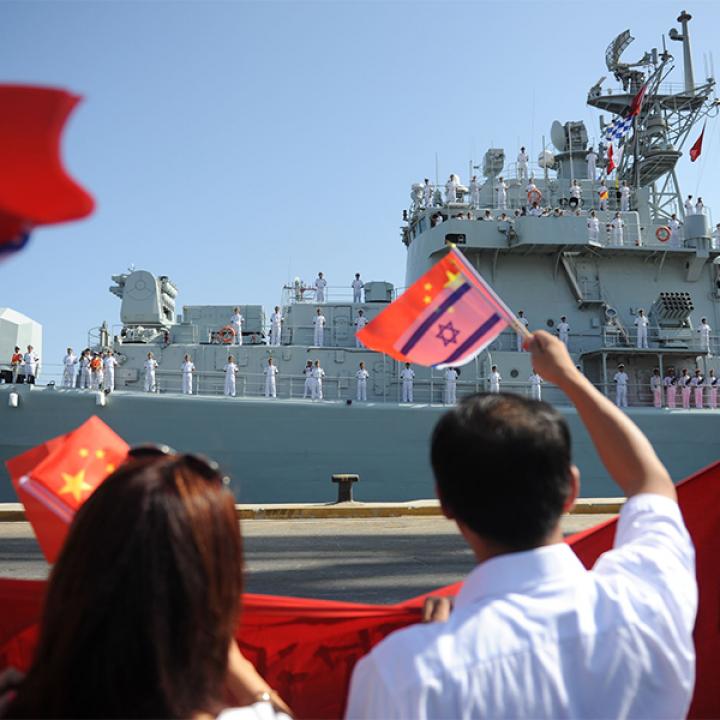

Despite concerns about stability, oil, and Islamism, Beijing will continue to let Washington underwrite security in the Gulf.
Security in the Forbidden City across the street from the Great Hall of the People was tight last month when Li Keqiang was installed as premier of China. But the uniformed guards weren't armed with automatic weapons. Instead, they were equipped with fire extinguishers to prevent would-be protesters from self-immolating.
China these days is consumed with concerns about domestic stability. Notwithstanding this internal preoccupation, the Middle Kingdom's increasing appetite for Persian Gulf oil has sparked unprecedented Chinese interest in the Middle East. Some of this is fueled too by Washington's "pivot to Asia" and less American dependence on Persian Gulf oil.
During a recent trip to China, I spent a week talking with analysts about the Arab Spring and the changing strategic dynamic in the Middle East. In surprisingly candid discussions, Chinese experts on that region -- many of whom spoke good Arabic -- described an evolving view of Chinese involvement in a troubled part of the world the state has long avoided.
China imports nearly 55% of its oil from the Persian Gulf, and it has long benefited from the U.S. security umbrella there. One Chinese analyst went so far as to describe the long-standing U.S. aircraft carrier presence there as a "public good." But these days Beijing is concerned about what the Obama administration's pledge to downsize the U.S. presence in the Middle East means for energy and regional security. Closer to home, the Chinese worry about the impact of rising Islamism on the state's restive Muslim population in the gas-rich western province of Xinjiang.
China's think-tankers concede that the People's Liberation Army is not yet capable of playing a security role in the Middle East. Consider that the navy's first deployment outside of Asia -- a three-ship anti-piracy escort mission in the Gulf of Aden -- occurred less than five years ago, and it was reportedly a stretch for the force. And even if the PLA were able to field troops in the region, Washington wouldn't want to "make room" for China in the gulf, I was told.
But the Chinese I spoke with grudgingly recognized that the People's Republic would eventually be compelled to start playing a bigger role in the Middle East. As one scholar noted, "China is a powerful state but doesn't act it."
While China will not soon contribute in a meaningful way to security in the region, it has been increasing its presence there, including deploying peacekeepers to U.N. contingents in Sudan and Lebanon. It is also laying the groundwork for a more robust regional military presence, establishing its so-called string of pearls network of naval bases that spans from Asia to the Persian Gulf.
Beijing is also raising its profile in the region in other ways. In 2009, Beijing appointed its first special Middle East envoy. And since 2011, China has vetoed three U.N. Security Council resolutions condemning Syria's Bashar Assad regime. Likewise, despite significant investments in Iran's energy sector, China has thus far complied with U.S.-led sanctions against Tehran to dissuade the theocracy from developing a nuclear weapon.
Beijing is also projecting soft power in the Middle East, making a concerted effort to increase trade and investment, especially in the energy sector. China and Gulf Cooperation Council states are negotiating a free-trade agreement. State-owned Chinese companies are building joint-venture refineries in Saudi Arabia and have secured contracts to construct mosques -- including a $1.5-billion shrine -- in oil-rich Algeria.
This new activism is not motivated by altruism. Beijing's priority is to secure ongoing access to Middle Eastern energy. At the same time, it doesn't want to see Iran go nuclear. But more important, it wants to avoid a fight with Washington over the sanctions.
The lessons of Libya were also sobering. China was later stung by its 2011 Security Council abstention in a vote that condoned international military action to "protect" the Libyan people but was subsequently exploited to topple Moammar Kadafi. Worse, during that revolt, 40,000 Chinese laborers had to be evacuated, and Beijing's consular and political sections in Tripoli were simply not up to the task. In the aftermath of the Libya debacle, China may bolster its diplomatic representation in the region.
While Beijing may augment its embassies and nascent military presence in the Middle East, there does not appear to be any indication that China will reevaluate its meager financial contributions to the region. Chinese scholars say Beijing is concerned about stability in Egypt, but it's hard to tell. Last summer, Egyptian President Mohamed Morsi traveled to China in search of economic assistance. He returned home with just $70 million, a grant worth less than Kobe Bryant's last contract.
It is not likely that China will soon contribute to a more stable region. Instead, what the Middle East needs, according to a March 20 editorial by the official New China News Agency, is "helping hands from a responsible and constructive superpower" like Washington. Regrettably, absent a concerted U.S. effort to cajole Beijing to provide grant assistance to struggling Arab states and to support tough U.N. Security Council measures against Iran, the Middle Kingdom will remain a peripheral actor in a turbulent Middle East.
After all, China recognizes that America's commitments to Japan and South Korea -- states dependent on gulf energy -- will long oblige Washington to underwrite security in the Middle East. So even as the Arab awakening has piqued Chinese concerns about stability, energy security and Islamism, for the time being, I was told, Beijing is content to remain a "free rider."
David Schenker is the Aufzien fellow and director of the Program on Arab Politics at The Washington Institute.
Los Angeles Times



